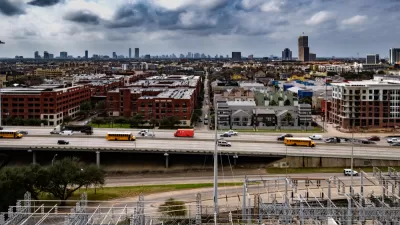Emily Badger looks at new data from the Pew Research Center that shows, "As Americans are growing farther apart on the income scale, we are also effectively moving apart from each other within cities, into our own economic enclaves."
As Richard Florida has pointed out, rising income inequality in America has created a growing gap between those with high-paying knowledge-based jobs and lower-wage service sector employees. According to a new report
from the Pew Research Center this disparity appears to be effecting where American's are choosing to live, leading to growing residential segregation by income in 27 of the 30 largest cities in the U.S.
Although it would seem logical that a growing disparity in incomes would lead to a growing disparity in the types of homes, and neighborhoods, that residents are able to afford, according to Paul Taylor, one of the report's authors, "Growing income inequality does not automatically lead to growing
residential segregation by income. Conceivably, we could still have a
middle class hollowing out but people still living in mixed
neighborhoods."
Accompanying the report are series of interactive maps depicting the economic segregation of America's 10 largest cities. Of note, "the most economically segregated large cities in America are all in Texas: San Antonio, Houston, and Dallas top the list."
FULL STORY: The Rise of Economic Segregation

Alabama: Trump Terminates Settlements for Black Communities Harmed By Raw Sewage
Trump deemed the landmark civil rights agreement “illegal DEI and environmental justice policy.”

Study: Maui’s Plan to Convert Vacation Rentals to Long-Term Housing Could Cause Nearly $1 Billion Economic Loss
The plan would reduce visitor accommodation by 25% resulting in 1,900 jobs lost.

Planetizen Federal Action Tracker
A weekly monitor of how Trump’s orders and actions are impacting planners and planning in America.

Wind Energy on the Rise Despite Federal Policy Reversal
The Trump administration is revoking federal support for renewable energy, but demand for new projects continues unabated.

Passengers Flock to Caltrain After Electrification
The new electric trains are running faster and more reliably, leading to strong ridership growth on the Bay Area rail system.

Texas Churches Rally Behind ‘Yes in God’s Back Yard’ Legislation
Religious leaders want the state to reduce zoning regulations to streamline leasing church-owned land to housing developers.
Urban Design for Planners 1: Software Tools
This six-course series explores essential urban design concepts using open source software and equips planners with the tools they need to participate fully in the urban design process.
Planning for Universal Design
Learn the tools for implementing Universal Design in planning regulations.
Caltrans
Smith Gee Studio
Institute for Housing and Urban Development Studies (IHS)
City of Grandview
Harvard GSD Executive Education
Toledo-Lucas County Plan Commissions
Salt Lake City
NYU Wagner Graduate School of Public Service





























